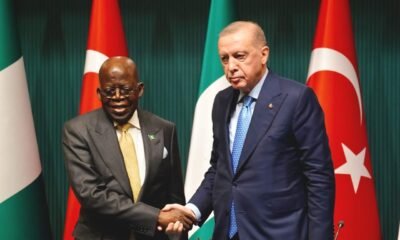BUSINESS
Things To Know About Seven Countries That Have Banned Cryptocurrency

Cryptocurrency is a digital currency that can be used to buy goods and services, but uses an online ledger with strong cryptography to secure online transactions.
It has become a widely accepted means of payment, with greater capacity and faster settlement than other traditional financial structures. Its use has, however, been prohibited in some countries.
An instance is Nigeria, which on Friday, through the Central Bank of Nigeria issued a circular directing banks to close accounts of persons or entities involved in cryptocurrency transactions within their systems.
Here are seven other countries where cryptocurrency trading has been banned as reported in TheCable.
ALSO READ: Witness Tells Court How Ex-zenith Bank Staff Authorised N700m Fraudulent Transactions
China
The People’s Bank of China, which is China’s central financial regulatory authority, placed a ban on all domestic and foreign cryptocurrency exchanges in the country in 2017. China-based financial institutions are also banned from dealing and funding cryptocurrency related activities.
This move was said to have been made in a bid to curb overseas transactions leading to regulatory compliance evasion, which the government feared would pose a higher risk of fraud.
Bolivia
In 2014, the central bank of Bolivia, issued a ban on bitcoin and every other currency not regulated by states, countries, and economic area. The government of Bolivia says the ban is necessary to protect boliviano, the country’s currency, and to protect citizens from unregulated currencies that could lead them to lose their money.
Morocco
Morocco’s foreign exchange office and central bank prohibits the use of cryptocurrency for transaction in the country. Any citizen caught engaging in transactions involving the virtual currency will be fined. Illegal activities such as sale of drugs and weapons were stated as concerns that led to the ban.
Ecuador
Bitcoin and other digital currencies are currently banned by the Ecuadorian government. The central bank of Ecuador also prohibits the buying and selling of cryptocurrencies through the internet. The bank maintains that cryptocurrency is not a means of payment in the country.
Iran
Iran’s central bank in 2018, announced that it was prohibiting all financial institutions, including banks and credit institutions from dealing in cryptocurrency. Buying and selling currencies in the country are also currently prohibited. The bank’s action was said to be in a bid to address the problem of terrorism and money laundering in the country.
Bangladesh
In Bangladesh, the use of bitcoin is considered illegal as in 2017, the Bangladesh bank issued a ban on cryptocurrency. The bank said this is because cryptocurrencies do not conform to Foreign Exchange Regulation Act, 1947, Anti Terrorism Act 2009 and Money Laundering Prevention Act, 2012. It asked citizens to refrain from all transactions involving virtual currencies.
Nepal
In 2017, Bitcoin and other cryptocurrencies became considered as illegal forms of financial tender in Nepal, according to Nepal Rastra bank act and the 2019 foreign exchange regulation act. Shortly after the ban, a dozen individuals were arrested for involvement in illegal bitcoin exchange in the country. The Nepal government maintains the ban is because bitcoin is not classified as a currency in the country. The country also does not have technology to regulate cryptocurrency transactions.
There still exists a lot of global debate as to whether cryptocurrency should be recognized as legal tender and how it should be regulated.
Laws on cryptocurrency are however, frequently changing as many countries who had banned the virtual currency had later on lifted the ban completely, or restricted its use.





















